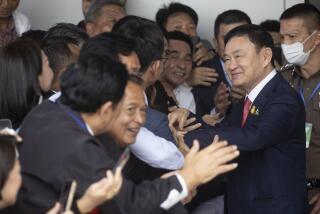Burma Weighs Drastic Overhaul of Stagnant Economy
- Share via
RANGOON, Burma — A special congress of Burma’s ruling party is considering drastic economic changes and may sweep away the rigid policies of outgoing leader Ne Win when it chooses his successor, official sources said Sunday.
The sources, who refused to be identified, said the changes being contemplated by the Burma Socialist Program Party include lifting barriers to private foreign investment for the first time since Ne Win seized power in 1962.
The 77-year-old Ne Win announced his resignation Saturday as party chairman, citing his age and indirect responsibility for bloody anti-government rioting in March and June. By party rules, action must taken to replace Ne Win by today, the final day of the closed-door congress.
Five other top leaders, including Burma’s president and vice president--positions less powerful than the party chairman--also resigned.
Prime Minister Maung Maung Kha, a senior member of the party’s 17-member Central Executive Committee, is seen as a likely replacement for Ne Win.
Ne Win, speaking at the opening session Saturday, proposed a referendum to let Burma’s 38 million people decide whether to abandon the one-party system that he set up 26 years ago.
He and his military colleagues had devised a unique amalgam of Buddhism, socialism and pragmatism after seizing power, nationalizing factories and commerce and turning the media into a mouthpiece of their ideas.
Sources at the party congress said proposals being discussed by the more than 1,000 delegates included an almost wholesale pullout of the government from economic sectors that it has tried with disastrous results to manage. These include agriculture, fishing, heavy industry, trade and transportation.
The sources said the proposals also include ventures between private, domestic concerns and private foreign investors, something Ne Win steadfastly opposed.
Muted Reaction
News of the possible economic changes and the resignations spread quickly through the capital of Rangoon. But public reaction was minimal.
“They (the government) are responsible for our poverty,” said one pavement hawker, echoing a sentiment heard among small-scale dealers in city markets.
“People need time to think about the meaning of this,” added a Burmese journalist.
But Western diplomats in Rangoon who have watched Ne Win gradually hand the formal reins of power to others but retain ultimate control as party chairman were skeptical.
“I doubt if it’s goodby. We haven’t seen the last of him,” one envoy said. “I wouldn’t be surprised if we see him back in control by the end of the year, maybe by ‘popular demand.’ ”
In speeches broadcast by state radio Sunday, some party members urged Ne Win to stay on. They also attacked Aung Gyi, a former colleague who emerged this year as Ne Win’s most prominent critic.
Letters Circulated
Aung Gyi’s open letters warning of “imminent catastrophe” unless reforms were introduced circulated before recent bloody clashes between police and protesters.
Since October, student-inspired demonstrations have rocked Rangoon and other Burmese cities three times, resulting in scores of deaths, arrests and the closure of universities.
The first demonstrations were sparked when the government withdrew several currency notes from circulation without compensation.
Burma, potentially one of the region’s most prosperous nations due to an abundance of natural resources, sank under Ne Win’s leadership to one of the world’s 10 poorest countries. It has an annual per-capita income of less than $200.
Burmese experts believe that more than 50% of domestic trade is done through the black market.
More to Read
Sign up for Essential California
The most important California stories and recommendations in your inbox every morning.
You may occasionally receive promotional content from the Los Angeles Times.













